Report Overview
Upon identifying the overall ESG disclosure score for the green fashion industry among top companies profiled in our research, it was found to be between 60% and 70%. This conclusion is based on the analysis of more than 60 Environmental, Social and Governance (ESG) parameters within our ESG scoring framework. Along with Kering SA and Industria de Diseno Textil SA, eight market leaders were part of our assessment.
This research identified that six companies, including Kering SA and Industria de Diseno Textil SA, scored above the average industry score. In comparison, the two other leading companies are required to improve their ESG transparency & reporting, and one of them scored less than 50%. Our research found that a majority of the ESG disclosures have been made around the environment metric, with Kering SA being a leader in the green fashion market when compared to other companies, such as Hennes & Mauritz AB, from an overall ESG disclosure point of view.
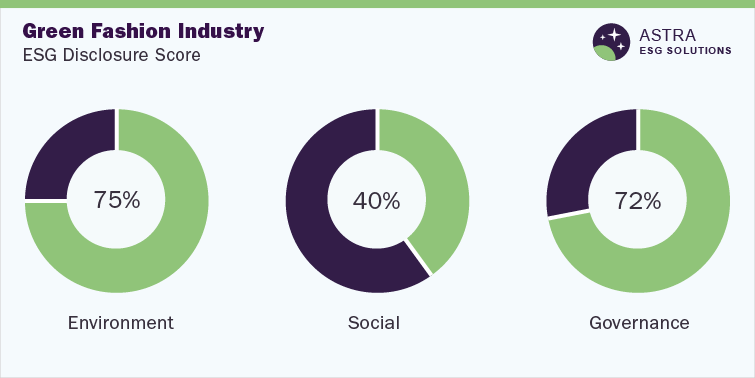
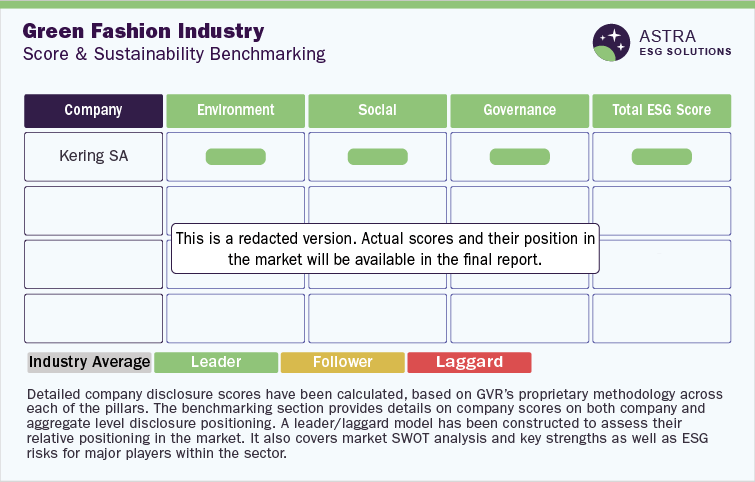
Environmental Insights
The concept of green fashion promotes the use of sustainable and renewable resources to harness green energy, carbon-neutral shipping, and environmentally friendly packaging, among others. Sustainability is considered a major factor by clothing brands, from production to distribution. Therefore, manufacturers, raw material producers, designers, transporters, warehouses, marketers, and retail professionals opt for green fashion to maintain sustainability.
All the companies in the sector have disclosed their scope 1 and 2 emissions, and 90% of them have renewable energy programs in their operations. When it comes to leading companies, Industria de Diseno Textil SA is leading in the environmental segment with a score of around 90%; however, it has the highest scope 1, 2 emissions & emission intensity rate, followed by Levi Strauss and Co. with a score of around 80%, which has the lowest scope emissions. This indeed reflects the commitment of Levi Strauss and Co. to attain carbon neutrality. The third place has been secured by Hennes & Mauritz AB (H&M),which has a lower scope emission and emission intensity than Industria de Diseno.
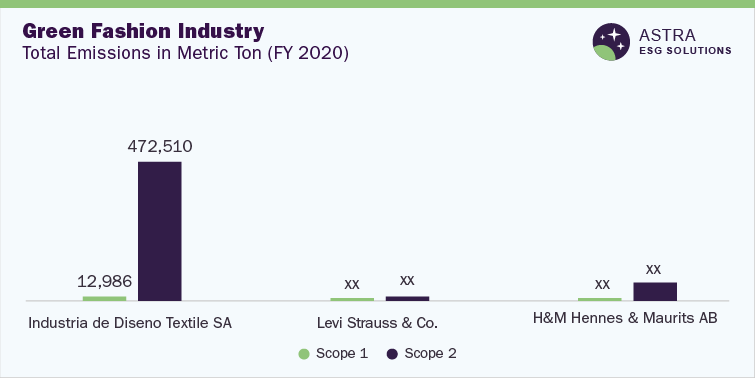
In terms of energy consumption, H & M has the highest consumption and energy intensity when compared to other leaders. In terms of environmental certifications, less than 40% of companies in the industry are certified to ISO 14001 certifications. Among the top three companies, H & M does not have an ISO 14001 certification. In contrast, Industria de Diseno Textil SA has an ISO 14001 certification for all its facilities and additionally has a commitment to clean energy & circular management models.
All the leading companies in this theme have their respective body, boards, personnel, or management committees to govern or monitor climate risks and opportunities and almost 90% of the companies in this industry have waste management programs.
As water is the crucial raw material for this segment, more than 60% of the companies in the industry have disclosed water management programs. In terms of the top three firms, all of them focus on water conservation programs; for example, Industria de Diseno Textil SA has a Green to Wear 2.0 program that encourages the usage of efficient processes and technologies that curb water consumption and meet public standards for water consumption. Around 40% of H&M Group supply chain facilities harvest rainwater wherever feasible. Moreover, they are planning to increase this to 50% by 2022 while exploring ways to maximize rainwater harvesting.
In recent times, several key companies have transitioned to circular models. In line with this, 90% of companies in the industry have disclosed waste management programs. To illustrate this, Industria de Diseno Textil SA discloses a zero-waste program in which the company is committed to recovering waste from its facilities by properly classifying, collecting, and recycling it through a designated waste manager.
Social Insights
In the social pillar of green fashion industry, Kering SA has been leading with a score of around 70%, followed by Industria de Diseno Textil SA and Adidas AG. Among the social parameters assessed in the industry, all companies in the industry have a human rights policy across their supply chain. Kering’s supply chain, including suppliers, subcontractors, and business partners, is subject to international human rights standards.
Furthermore, 75% of the companies assessed possess a supplier code of conduct, which emphasizes human rights policies and issues. Moreover, around 90% of the companies in the industry have targets to improve gender diversity in their workforce. For instance, Kering aims to achieve gender balance across its workforce by 2025 and also offers equal pay to all its employees.
In terms of employee turnover rate, Industria de Diseno Textil SA has the highest score, followed by Kering SA. Meanwhile, Adidas AG did not disclose the turnover rate for the fiscal year 2020, and the value for the other top two companies has been plotted in the graph. The lower retention rate in Industria de Diseno Textil SA showcases that the company lacks commitment to employment quality and welfare.
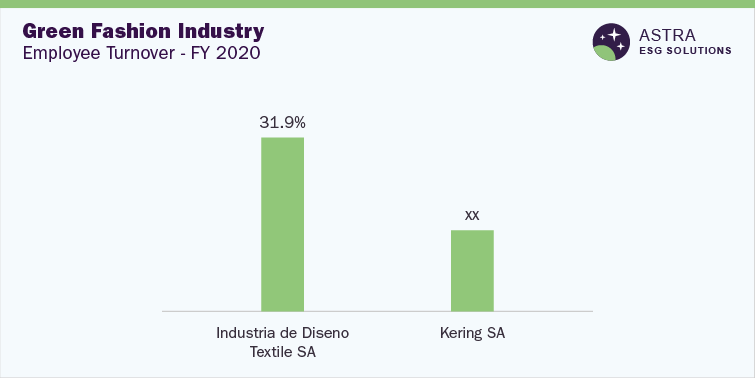
More than 60% of the firms in green fashion industry have a health and safety certification such as the ISO 45001 or OHSAS 18001 certification, with all three leading companies having been certified as of 2021. For example, Kering SA has been ISO 45001 and OHSAS 18001 certified at 22 locations under several brands, including the Gucci headquarters, LGI, logistics platforms, and tanneries.
Additionally, Adidas AG also disclosed that some of its sites were ISO 45001 certified for health and safety management systems. Another vital social factor has been the employee injury rate. Less than 20% of firms in this industry disclose data regarding employee injury rates in their operations, which is a major risk in the industry, given the high percentage of workplace incidents occurring in the fashion industry.
Governance Insights
Governance is an important factor that affects the valuation of businesses in terms of corporate governance, code of business conduct, risk & crisis management, tax strategy, supply chain management, and policy influence & materiality. Among all the firms analyzed in our research, higher disclosures have been made around directors on board. All companies in our research aim to improve gender diversity on board, with all companies having more than 30% women directors on board. Kering SA is leading in governance factor with a score of more than 80%, followed by Levi Strauss & Co. and Industria de Diseno Textil SA.
Among the top three performers, Kering SA has the highest percentage of female representation at around 60%, which clearly indicates that the company is focusing more on board diversity compared to its peers. However, Levi Strauss & Co. reports that it had around 90% of independent directors in the FY 2020, which is the highest, followed by Industria de Diseno Textil SA and Kering SA. Independent directors are vital as they help the company in improving corporate credibility and governance standards.
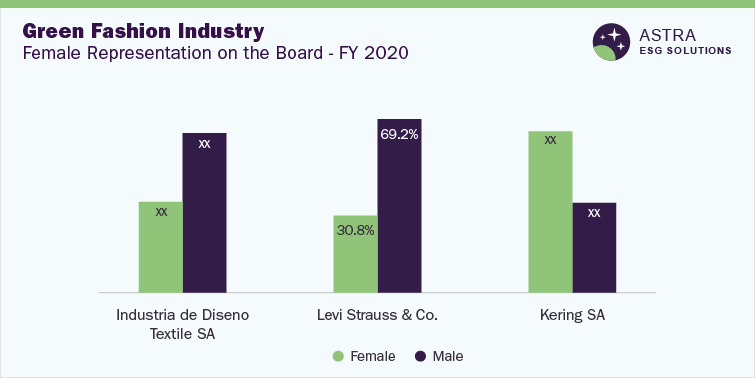
Robust policies for combating cyber threats are crucial for all leading companies. One of the companies disclosed that it has a Chief Privacy Officer and Chief Information Security Officer to monitor any such threats and ensure that the global privacy framework is followed. More than 60% of the firms in the industry have a cybersecurity policy in place.
Among the top three firms, Kering SA has not disclosed any information on the cybersecurity committee; however, through extensive IT security efforts, including the company's transformation plan and a stepped-up employee awareness program, the group is developing e-learning modules on cybersecurity and data confidentiality, which includes one on remote working.
A business continuity plan is the essential factor that ensures the survival of the business in the green fashion industry. However, less than 30% of firms in the industry have made disclosures about BCP. Among the top three firms, Levi Strauss & Co. does not disclose any plans for the company to tackle operational work or any disaster. Prominently, Industria de Diseno Textil SA and Kering SA have governing bodies like emergency management committees, led by management for each business unit, which were established and consolidated during the pandemic. However, only Levi Strauss & Co. has adopted a clawback or malus policy for recovering the money. As per this policy, the company has the authority to reclaim bonus funds or investments that it previously offered to the employee in case an employee underperforms or commits misconduct.
Country-level Insights
In China, innovative programs like Clean by Design (CbD)-founded in 2009-have been explored and developed, mainly to reduce negative environmental impacts created by textile manufacturing mills. In China, the CbD program has been implemented across more than 38 textile mills. This program incorporates practices such as recapturing heat, recycling water from rinse cycles, and insulating steam systems. In addition, the focus of CbD is on the selection of raw materials, efficiency of manufacturing, movement of goods, and customer care requirements.
The U.S. has been extensively working in the innovative space and holds leading patents in this domain. In 2022, the first Fashion Sustainability Law in America was passed in New York State. According to the law, companies in the U.S. clothing industry with more than USD 100 million in revenue must disclose social and environmental impacts stemming from their production methods.
Meanwhile, Australian companies with a turnover of more than AUD 100 million (USD 69.57 million) must publish a Modern Slavery Statement that discloses their supply chain practices and operations. The companies are required to disclose supply chain risks regarding modern slavery publicly.
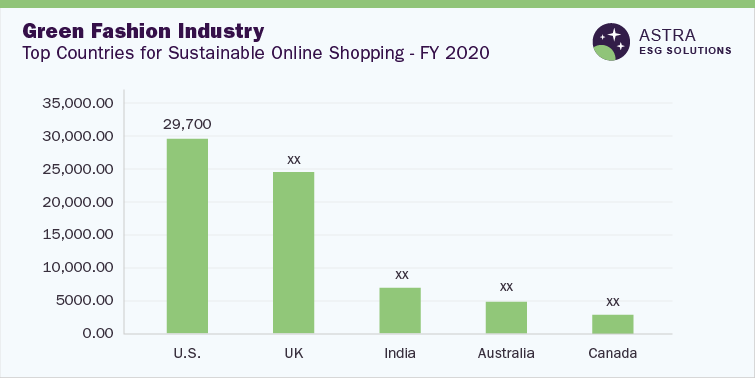
To improve responsibility and sustainability in fashion, the School of Fashion Technology (SOFT) in Pune developed an initiative called Green Fashion India (GFI) to promote research in green fashion. The platform is aimed to set up a forum for individuals, institutions, & organizations within the fashion and textile industry. It will help increase ecological awareness among entrepreneurs, companies, and brands through fashion enhancement, fashion research, and education to promote the exchange and implementation of sustainable practices that facilitate social design and enrich sustainable living. The company aims to create a culture of upcycling by providing sustainable t-shirts made from recycled plastic polyester for events, corporates, bulk buyers, and brands.
Market Overview
The global green fashion market is yet to be valued. The concept of green fashion promotes the use of sustainable and renewable resources to harness green energy, carbon-neutral shipping, and environmentally friendly packaging, among others.
Sustainability is considered a major factor by clothing brands, from production to distribution. Therefore, manufacturers, raw material producers, designers, transporters, warehouses, marketers, and retail professionals opt for green fashion to maintain sustainability. Customers’ perspective of sustainable fashion is about understanding the power of their purchase.
Apart from being conscious about their purchase, it is also about being mindful of the apparel manufacturing process. Being considerate of materials used to create the product, timeless designing, and the process used by the brand to craft the product are essential decisions when it comes to sustainable purchase behavior. However, market dynamics, multiplicity among the number of manufacturers, and economic constraints within the clothing sector challenge policies and programs supporting green fashion.


